CO2 Alarm System
If you are looking for a CO2 alarm system that helps you and your team eliminate manual logging, improve compliance readiness, and protect all your temperature-sensitive assets, you’ve arrived at the right place.

Let us help you evaluate your needs!
- Safety: Alerts via text, email, push notifications and phone calls to protect your precious assets
- Compliance: Automated compliance reports
- Efficiency: Reduced Manual Logging and time spent on reports
And what makes us different?
- Lifetime Warranty: Never buy hardware again!
- Unlimited Users: Scale across your entire organization
- Connectivity Flexibility: Wi-Fi, Cellular or Data Hub
- Phone call alarms: Alerts won't get ignored
- Mobile App: 500 Freezers in your pocket
- Facility monitoring: Simple to add water leak, door open, occupancy, and even IAQ monitoring
Engineered in Indiana with U.S.-based support.
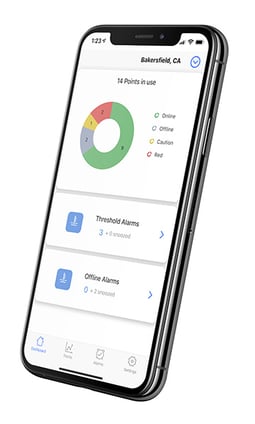
See What Customers Say About Sonicu
Asset Protection. Compliance Automation. And Reduced Manual Processes.
Sonicu serves thousands of professionals at hundreds of organizations across North America by improving how they monitor and manage their most sensitive assets and environments.
Professionals from healthcare, life science, laboratory and cold chain facility management turn to Sonicu to help them improve the way they do business.
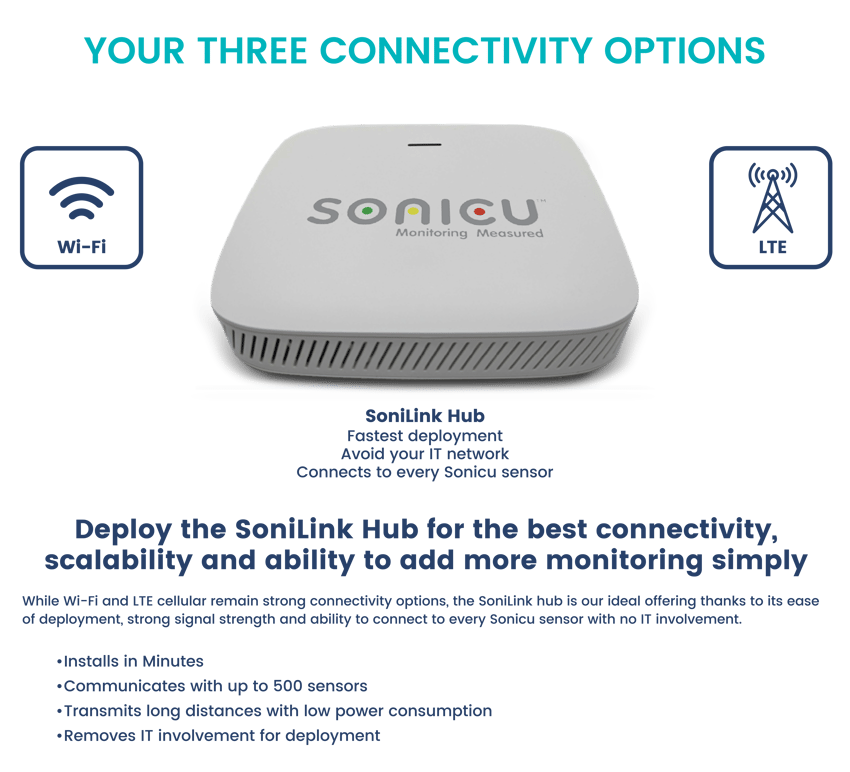
- Real-Time Monitoring: The sensors collect temperature data and transmit it wirelessly to Sonicloud - our cloud-based platform.
- Operational Efficiency: Virtually eliminate the need for tedious and costly manual logging
- Compliance Automation: Respond to virtually any regulatory audit or inspection in a few clicks with our reports section
- Asset Protection: Detect and respond to any temperature excursion that can threaten virtually anything perishable: food, drugs, vaccines, research, etc.
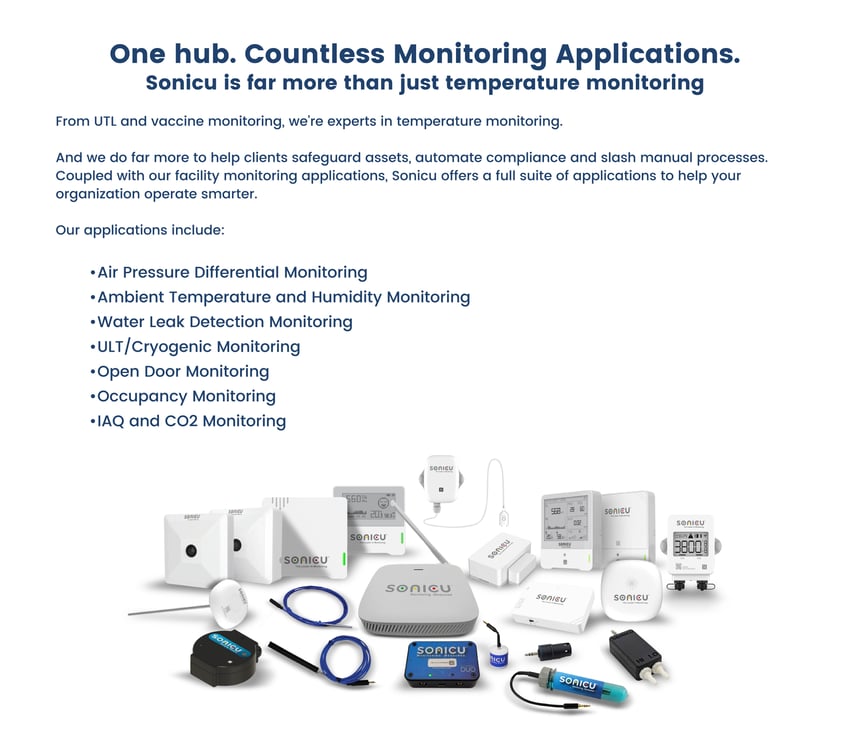
Cost competitiveness, great customer service, great control over the monitoring system, and low maintenance. You can't beat that.
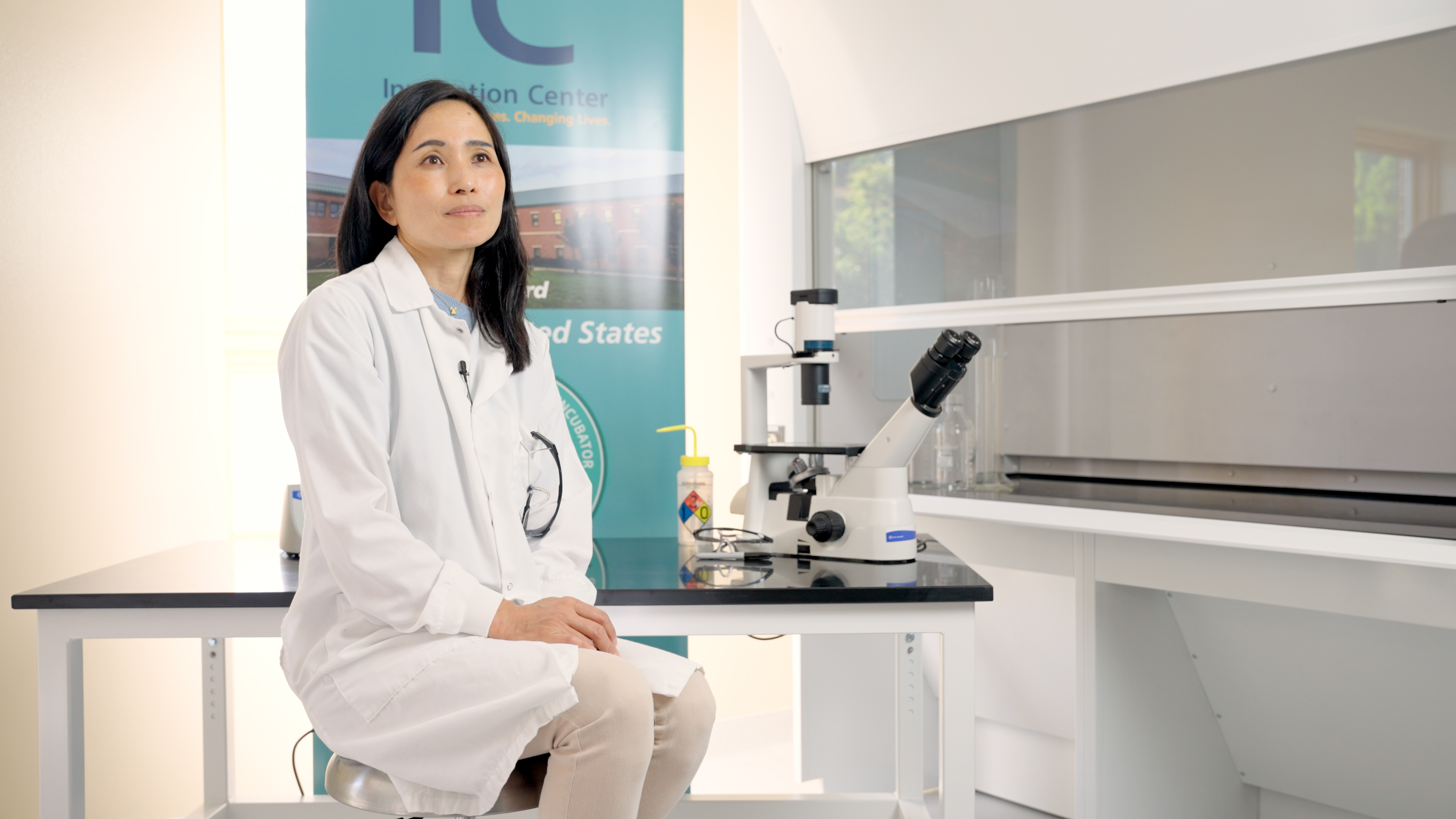
Sonicu costs are considerably more reasonable than our historic system, as well as other competitors on the market. The equipment is robust but simple to learn and utilize.

Having safe and secure storage provides reassurance that any future family building efforts will be protected. Sonicu gave us the ability to more easily put our head on the pillows and sleep easier at night knowing we had invested in a strong monitoring system.”

Breathing Easier: How the Right CO2 Alarm System Can Revolutionize Safety and Efficiency
A CO2 alarm is a device designed to detect and alert people to dangerous levels of carbon dioxide in the air.
These alarms are crucial in various settings for maintaining safety, operational efficiency, and compliance with health standards.
CO2 alarms monitor the concentration of carbon dioxide in the air. When CO2 levels exceed a pre-set threshold, the sensors alert your devices via call, text, email, or push notification.
These devices often use infrared (IR) sensors or chemical sensors to detect CO2 levels. IR sensors measure the absorption of infrared light, which varies with CO2 concentration.
The sensitivity and thresholds can be adjusted based on the environment and regulations. Industrial alarms typically have higher sensitivity and faster response times.
These alarms are commonly used in manufacturing plants in industries where CO2 is a by-product, such as fermentation in breweries or chemical manufacturing, to prevent hazardous exposure.
For instance, CO2 is often a by-product of chemical reactions. Monitoring is essential to prevent unsafe accumulations. Other notable manufacturing facilities where CO2 monitoring is vital are soft drink and bottling plants, the pharmaceutical industry, metal fabrication and welding, the paper and pulp industry, greenhouses, and waste management and recycling facilities.
A CO2 alarm system is also essential for controlled environment agriculture (CEA) where CO2 levels are elevated for plant growth.
CO2 monitoring is also a necessity in healthcare facilities, especially in areas where CO2 is used or stored, such as in laparoscopy or respiratory therapies.
These gadgets are also useful in breweries and wineries in monitoring fermentation areas and storage cellars.
In restaurants, bars, and entertainment venues, CO2 alarm systems are in widespread utilization, particularly in kitchens with confined spaces and gas stoves.
They are also needed in offices and schools to ensure indoor air quality, as elevated CO2 levels can impact cognitive function and productivity.
Due to the nature of their closed environments, monitoring CO2 is crucial for life support systems in submarines and on spacecraft:
The impact of a CO2 alarm system on operations across industries is immense:
It ensures a safe working environment in diverse sectors, helping businesses comply with occupational health and safety regulations.
Also, real-time alerts from these devices allow for timely intervention before hazardous levels are reached, preventing potential shutdowns.
In HVAC systems, CO2 levels can guide ventilation control, improving energy efficiency.
In offices and schools, maintaining optimal CO2 levels can also improve concentration and overall well-being.In Industries such as brewing, precise CO2 level monitoring is essential for product quality.
A CO2 alarm system plays a significant role in risk mitigation processes as it reduces the risk of CO2 poisoning and related liabilities, particularly in industries with high CO2 exposure.
The implementation of a CO2 alarm system is a necessity in various industries not only for compliance with safety standards but also for enhancing operational efficiency and ensuring the well-being of individuals.
Its impact spans across improving health and safety conditions, maintaining product quality, and even enhancing energy efficiency in certain applications.
As technology advances, the integration of CO2 alarms with smart monitoring systems is further optimizing their effectiveness and utility in a variety of industries.
You can learn more about how our software helps compliance professionals in these case studies:
Problem: Too many false alarms on cryo monitoring lead to ignoring an alarm
Solution: Smart alarms that don’t produce alert fatigue
Problem: Cumbersome and costly legacy monitoring with difficult customer service
Solution: Simple and affordable solution with third-party sensor capabilities to drive down costs
Hamilton County Health Department: Vaccine Protection and Compliance.
Problem: Data loggers that lacked remote viewing capabilities and compliance automation
Solution: Remote viewing capabilities for weekend peace of mind and simple compliance
What are the key components of a CO2 alarm system?
A typical CO2 alarm system comprises several key components, each playing a crucial role in ensuring efficient and accurate detection of carbon dioxide levels. The system leverages various technologies to perform its functions.
- Sensors
- The sensor is the core of the alarm system, responsible for detecting CO2 levels in the air.
- Commonly used types include Non-Dispersive Infrared (NDIR) sensors and chemical sensors.
- NDIR technology uses an infrared light source, a light detector, and a wavelength filter to measure CO2 concentration based on infrared absorption.
- NDIR is highly specific to CO2, boasts long-term stability, and has decreased maintenance requirements.
- Chemical sensors react chemically with CO2 to produce a measurable change, often in electrical resistance.
- Chemical sensors are more prevalent in portable or smaller-scale applications.
- Control unit
- Its processor interprets data from the sensors and determines if CO2 levels are above the safety threshold.
- Its user interface displays CO2 levels, system status, and alarms. May include buttons or touch screens for configuration.
- Alarm indicators
- Audible alarms such as sirens or buzzers are activated when CO2 levels exceed safe limits.
- Visual alarms such as flashing lights or LED indicators alert of high CO2 levels, system faults, or maintenance needs.
- Power supply
- Systems can be battery-operated or connected to a building's electrical system.
- Backup power ensures the system remains operational during power outages, which is critical in environments where power stability is a concern. Types include long-life batteries and rechargeable options for sustainable operation.
- Communication modules
- May be wired or wireless and facilitate a connection between the system and the central monitoring system or network.
- Wireless communication systems enable remote monitoring and integration with building management systems. They can be integrated with HVAC systems for automated ventilation control.
- Examples include Wi-Fi, Bluetooth, cellular, or proprietary wireless protocols.
- Data logging and reporting
- Tracks CO2 levels over time, which is useful for trend analysis and compliance reporting.Could include USB or network connections for data export.
- Microprocessor technology
- Processes sensor data, runs diagnostics, and controls the alarm mechanism.
- Allows for programmable alarm thresholds and customized responses.
- Building Automation
- Integration with smart building systems for energy efficiency and safety compliance.
A CO2 alarm system is a sophisticated assembly of sensors, control units, alarm mechanisms, and communication modules, all powered by advanced technologies like NDIR and microprocessors.
This integration of components and technologies allows the system to detect CO2 accurately, alert occupants effectively, and integrate seamlessly with other building systems for comprehensive safety and efficiency management.
Companies such as Nomi Health have trusted Sonicu to provide them with peace of mind when it comes to temperature and environmental monitoring. Other benefits they receive by choosing Sonicu include:
- Asset Protection: Get alerts when a freezer is malfunctioning to protect assets like medicines, vaccines, blood, research, sperm/eggs
- Compliance Automation: Creates simple reports to satisfy local/state/federal regulations
- Operational Efficiency: Spend less time capturing data manually: Both temps/conditions and reporting
What are the pain points that a CO2 alarm system can effectively address?
A CO2 alarm system is designed to address several critical safety and operational challenges in environments where carbon dioxide levels might pose a risk.
Pain point: CO2 is a colorless, odorless gas that can be harmful or even lethal at high concentrations.
Solution: CO2 alarms detect dangerous levels, preventing asphyxiation or poisoning.
Pain point: Many industries have legal requirements for maintaining air quality standards.
Solution: A CO2 alarm system can help in complying with these regulations, ensuring a safe workplace.
Pain point: In environments such as offices or classrooms, high CO2 levels can affect cognitive function and overall well-being.
Solution: CO2 alarms can help maintain a comfortable and productive environment.
Pain point: In greenhouses or indoor agriculture, CO2 levels need to be carefully balanced for optimal plant growth.
Solution: A CO2 alarm system can ensure levels stay within the desired range.
Pain point: In industries such as brewing or chemical manufacturing, precise CO2 levels are crucial for product quality.
Solution: CO2 alarms can monitor and alert if levels go beyond the optimal range.
Pain point: Storage and transportation of perishable goods.
Solution: Monitoring CO2 levels in storage facilities, especially where perishable goods are stored under controlled atmospheres, is vital for quality preservation.
Pain point: Energy efficiency and HVAC management.
Solution: A CO2 alarm system can be integrated with HVAC systems to control ventilation based on CO2 levels, enhancing energy efficiency.
Pain point: Optimizing air exchange.
Solution: Ensures that air exchange is based on actual air quality needs rather than arbitrary schedules, saving energy and reducing costs.
Pain point: Emergency preparedness and response.
Solution: Provides early warnings in case of CO2 leaks, allowing for prompt evacuation and response, thereby minimizing potential harm.
Pain point: Facilitating evacuation and rescue operations.
Solution: In an emergency, knowing the CO2 levels can guide first responders and aid in safe evacuation strategies.
Pain point: Compliance and reporting.
Solution: Many industries are required to keep CO2 levels below certain thresholds. A CO2 alarm system can help in maintaining compliance with these regulations.
Pain point: Data logging.
Solution: Advanced systems offer data logging features, enabling organizations to maintain records for compliance and reporting purposes.
Pain point: Scalability and flexibility.
Solution: CO2 alarms can be configured for various environments, from small confined spaces to large industrial areas.
Pain point: Customizable alert thresholds
Solution: Different industries have different safe thresholds for CO2 levels. Alarms can be calibrated accordingly.
The effectiveness of a CO2 alarm system in addressing these pain points makes it an indispensable component in many industries and settings. By ensuring safety, compliance, and operational efficiency, these systems not only protect human health and life but also contribute to maintaining quality and sustainability in various processes and environments.
Check out Sonicu’s Customer Stories for our consumers' views on our systems’ benefits.
You can learn more about how our software helps compliance professionals in these case studies:
Problem: Data loggers that were not on the cloud and cloud-based solution that only connected via wi-fi
Solution: Cloud-based solution with connectivity in wi-fi AND cellular for maximum flexibility and compliance readiness
Problem: An aging walk-in cooler with a faulty electrical system caused system failure and a loss of $5,000 in food
Solution: Simple and affordable temperature monitoring solution that protects costly food and automates compliance.
Key benefits of a CO2 alarm system
- They provide early detection of dangerous CO2 levels, helping to prevent asphyxiation or poisoning in environments where CO2 is used or generated.
- These systems help ensure workplace environments meet health and safety standards, reducing potentially costly regulatory issues or violations.
- A CO2 alarm system can help maintain optimal air quality in enclosed spaces such as offices or classrooms, which is crucial for comfort and cognitive function.
- In specialized environments such as greenhouses, maintaining precise CO2 levels is key to operational success. CO2 alarms assist in achieving this balance.
- When integrated with HVAC systems, a CO2 alarm can optimize ventilation based on actual air quality needs, leading to energy savings.
- By preventing over-ventilation, these systems can significantly reduce heating and cooling costs.
- In industries such as brewing or food packaging, maintaining specific CO2 levels is critical for product quality. CO2 alarms help in monitoring and maintaining these levels.
- They provide consistency and reliability in processes where CO2 levels are a critical factor.
- A CO2 alarm system helps businesses adhere to health and safety regulations regarding CO2 exposure.
- Advanced systems with data-logging capabilities allow for historical data analysis and compliance reporting.
- They can be integrated into smart building systems for automated responses, such as adjusting ventilation.
- Some systems offer remote monitoring capabilities, allowing for off-site management and alerts.
- They may be installed in a variety of environments, from small confined spaces to large industrial complexes.
- They allow for customizable threshold levels and alarm settings to suit different industry needs.
- CO2 alarms utilize advanced sensor technologies such as NDIR for accurate and reliable measurements.
- The CO2 alarm system is generally low-maintenance and offers long-term stability in its readings.
Founded in 2008 in Greenfield, Indiana, Sonicu began manufacturing noise monitoring to protect vulnerable infants in neonatal intensive care units, and has evolved to monitor and protect a diverse set of sensitive conditions and environments.
Asset Protection. Compliance Automation. And Reduced Manual Processes. Sonicu serves thousands of professionals at hundreds of organizations across North America by improving how they monitor and manage their most sensitive assets and environments.
From cold and frozen temperature storage to ambient conditions like relative humidity and air pressure differential to specific needs, such as CO2 and VOC monitoring, Sonicu provides a full suite of monitoring solutions.
Easy to install and configure and supported by live American-based phone support, Sonicu is the affordable, intuitive and trusted temperature and environmental monitoring solution trusted nationwide.
In addition to aiding refrigeration temperature monitoring, Sonicu plays a vital role for organizations in other industries such as Ohio University and others including:
- Healthcare: Nurses respond to our alerts to keep your medicine safe
- Life Science/Lab: Lab directors rely on our alerts to protect priceless research
- Universities: Research and science department heads rely on our alerts to keep research and classroom labs safe.
- Food Service: Food distributors rely on our tech to protect your dinner
Sonicu's Solution: Elevate Your Safety Standards with Advanced CO2 Monitoring
In an era where safety and efficiency are paramount, the importance of reliable CO2 monitoring cannot be overstated. As we've explored, CO2 alarm systems are not just a regulatory compliance tool; they are a critical component in safeguarding health, enhancing operational efficiency, and ensuring environmental control.
The risks associated with high levels of CO2 – from health hazards to compromised productivity and process inefficiency – call for a proactive approach to monitoring and management.
Sonicu’s cutting-edge CO2 alarm system represents the pinnacle of this proactive approach.
By integrating advanced sensor technology, smart integration capabilities, and user-friendly interfaces, Sonicu provides a solution that is not only effective but also adaptable to a wide range of industries and environments.
Whether it's in healthcare facilities, educational institutions, manufacturing plants, or controlled agricultural setups, Sonicu's system stands as a bulwark against the invisible threat of carbon dioxide.
The benefits of implementing a state-of-the-art CO2 monitoring system like Sonicu's are clear.
Enhanced safety, compliance with health standards, operational efficiency, and energy savings are just the tip of the iceberg. The real value lies in the peace of mind that comes from knowing your environment is continuously monitored and managed with the utmost precision and reliability.
In a world where the margin for error is increasingly slim, and the cost of negligence is high, can you afford not to invest in the best protection for your employees, your processes, and your property?
It’s time to take control of your environment's safety and efficiency. It’s time to choose Sonicu’s CO2 alarm system.
Move forward toward a world full of safety and efficiency.
Contact Sonicu today to learn more about our advanced CO2 monitoring solutions and how they can be tailored to meet your specific needs. Don't wait for the unseen dangers of CO2 to make their mark – act now and ensure a safer tomorrow.
American-based Customer Support: Robust & Reliable High Touch Service
Software and technology is only as good as the people who stand behind it.
At Sonicu, that means our team of American-based customer success managers who are never more than a phone call away to help field and fix any service issues.
Our probes and sensors are placed in demanding frozen environments and our software literally sends billions bits of data monthly, meaning there’s always the potential for a hiccup on either the hardware or software.
We are committed to fielding every customer service request promptly and addressing our customer’s concerns promptly and professionally.
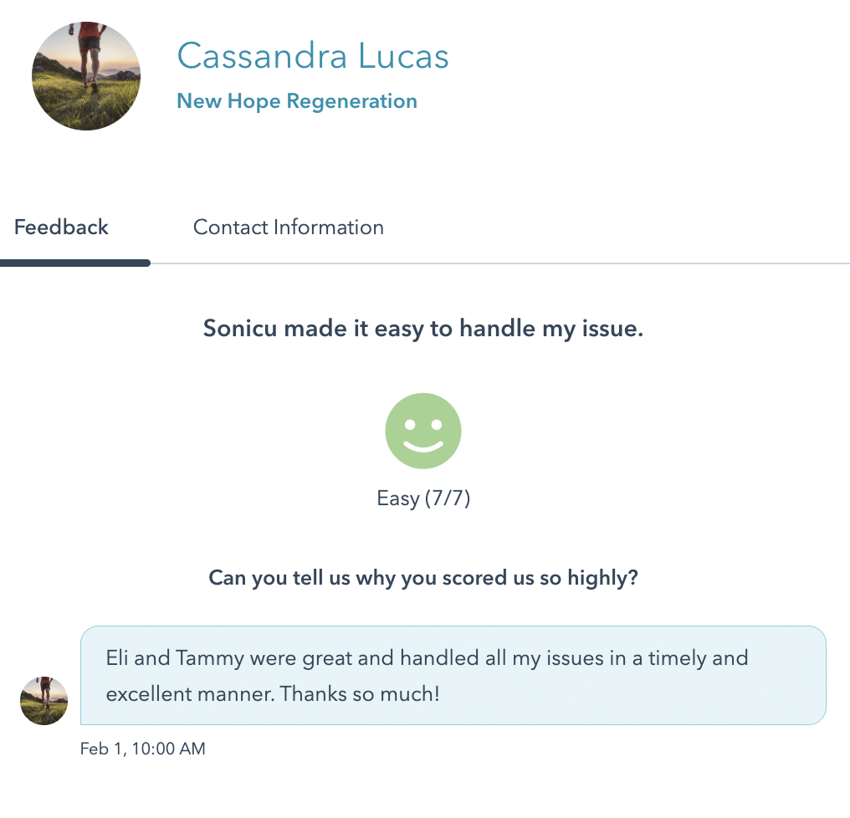
 “I like to say that every refrigerator or freezer is like a car in that they all behave a bit differently,
“I like to say that every refrigerator or freezer is like a car in that they all behave a bit differently,
and then every now and then you just get a bad boy who doesn’t want to perform as we need it to,”
Martha Rardin, Director, Nutrition and Dietetics, Hendricks Regional Hospital.
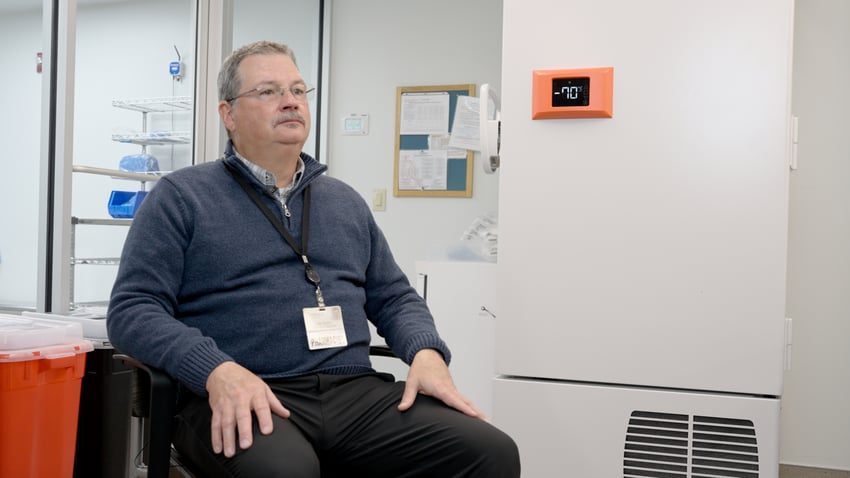 “Sonicu has been a powerful tool to identify which units are behaving out of spec and get our team
“Sonicu has been a powerful tool to identify which units are behaving out of spec and get our team
to fix them before we have a serious issue.”
Tim Livesay, Director, Hancock Regional Hospital Pharmacy Director




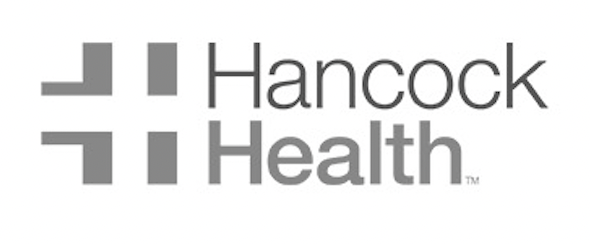




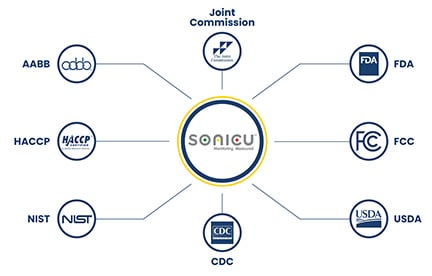
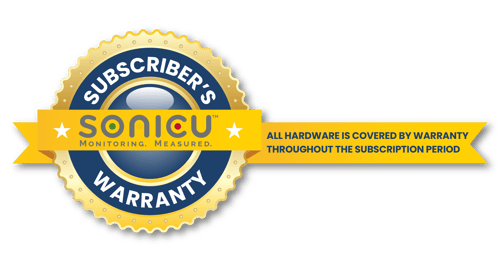


How IU Health
consolidated all of its pharmacy monitoring needs
into one cloud-based platform serving dozen of locations.